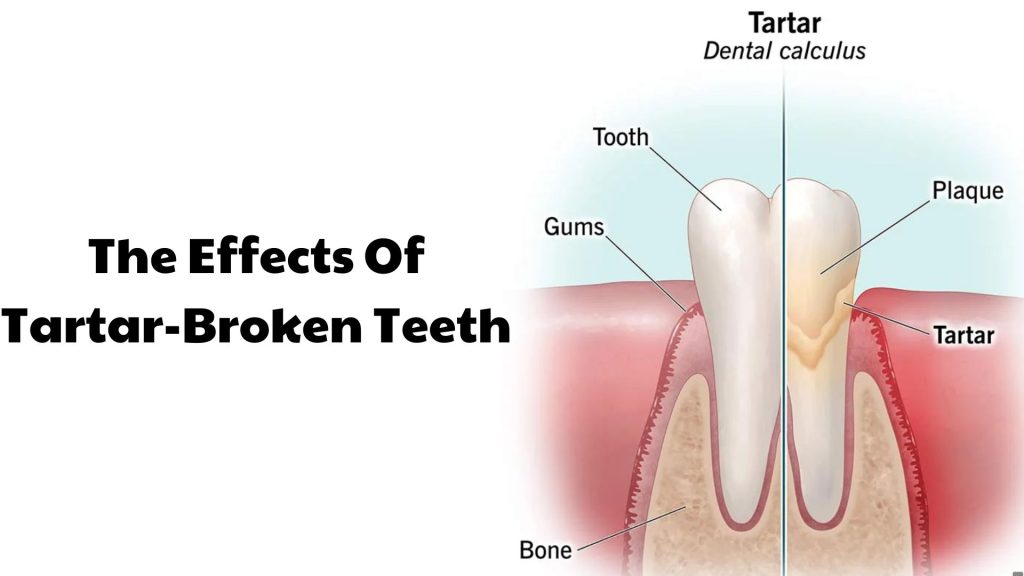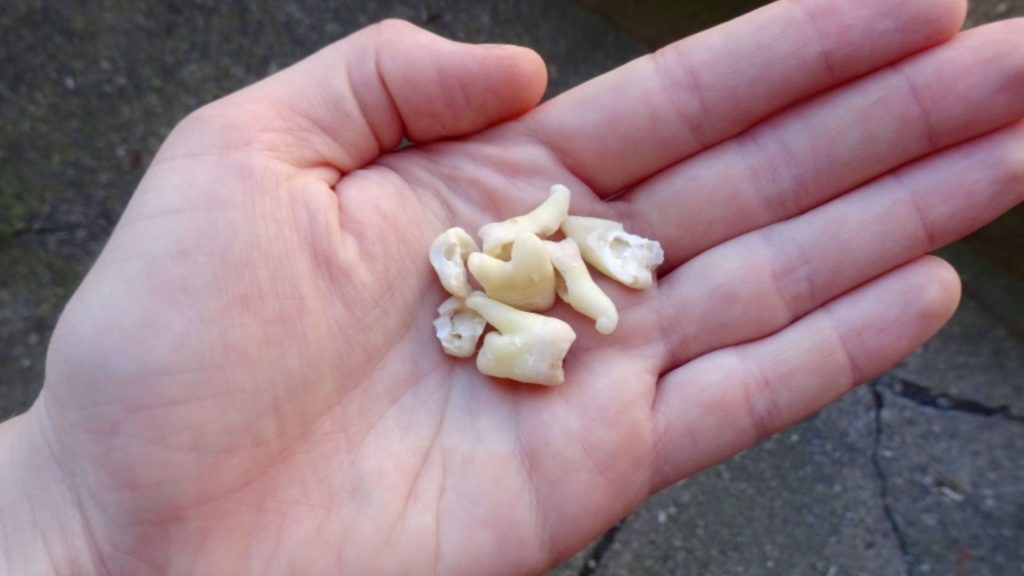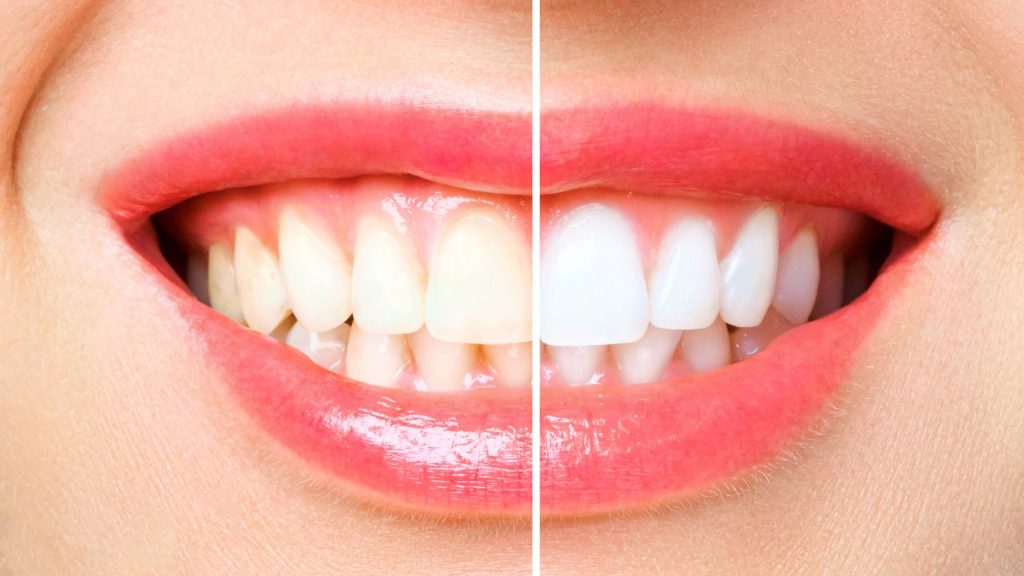Why is Tartar Breaking off Teeth? Tartar buildup may exacerbate already concerning tooth cracks. Understanding the process and reasons for the connection between tartar and tooth breakage will be the focus of this discussion. Let’s go into this issue to learn more about tartar’s effects and the steps we may take to safeguard our teeth and gums.
The Effects Of Tartar-Broken Teeth

Tooth fractures caused by tartar may have serious effects on one’s dental health and general well-being. Some of the most typical manifestations of this condition include:
- There is pain and discomfort.
- The inability to chew and consume correctly.
- Aesthetic value.
- Infection and inflammation are both present.
- Impact on the mind.
Impact Of Tartar On Teeth
Plaque—yellow scale—is a frequent oral problem where bacteria and other pollutants collect on teeth. If not removed promptly, yellow flakes may harden and smoothen on the teeth, forming tartar. The production and buildup of yellow scales and tartar may have a major influence on the structure and general health of the teeth.
- Accumulation and formation of tartar: Tartar occurs on teeth when bacteria, food leftovers, and saliva build a smooth layer. The minerals in saliva may solidify yellow flakes into tartar, an oily material that is tougher to remove.
- Linked to the weakening of tooth structure: Oral health and aesthetics are both affected by tartar. Tartar may damage tooth enamel. This erodes enamel, weakening and damaging teeth. Weak enamel increases the danger of chipping, shattering, and fracturing teeth when eating or contacting other teeth.
In short, tooth structural deterioration from tartar may spread to neighboring teeth, causing gingivitis, infection, and even tooth loss. So, knowing how yellow flakes affect tooth structure is crucial to preventing and treating this problem and protecting oral health.
Why Is Tartar Breaking Off Teeth?

In order to maintain optimal oral health, it is necessary to possess knowledge of the underlying causes of oral health issues. Tartar, often known as “high bite point,” is a distinctive etiological factor contributing to dental fractures, a prevalent and consequential dental ailment. This section explains why tartar breaks teeth, how it does it, and why it should be avoided. Before protecting our teeth from tartar and how it might damage them, we must understand how tartar affects tooth structure.
Pressure And Friction
The mechanisms of tartar fracture are influenced by pressure and friction. Tartar (also known as a high bite or high contact point) may harm both teeth when it is not correctly aligned with neighboring teeth while the mouth is closed. This is a prevalent issue in dentistry and may result in major oral health issues:
- Pressure: The bite elevation may not line with neighboring teeth when the upper and lower teeth are near. This concentrates pressure at the high biting point rather than equally over the tooth surface. This pressure might cause the high bite point to struggle to react to neighboring tooth force.
- Friction: At the high point of the bite, tartar that is misaligned with neighboring teeth typically contacts them. The teeth sliding past one other when biting and chewing causes a lot of friction here. This friction is painful and might destroy the teeth.
In conclusion, pressure and friction at the high biting point may harm both teeth. High pressure and friction may chip, shatter, or weaken tooth structure at the high point of bite. These injuries make teeth more likely to break while eating or being hit.
Potential Tooth Chipping And Weakening
Tartar, also known as a high bite point, not only generates unpleasant pressure and friction between teeth, but it may also cause microscopic chippings in the surface of the tooth. This is particularly true when high bite marks are not repaired or managed promptly.
Create small chipping on the tooth surface:
A tartar that is misaligned with neighboring teeth may cause asymmetric contact and focused force at the high bite point. Small chippings may emerge on teeth when chewing or other oral activities. Bacteria and plaque may cause cracking and weakness in these chips.
When a tooth’s enamel is chipped, the underlying tooth structure becomes compromised. If left untreated, these fissures may enlarge and collect germs and plaque. When microorganisms degrade enamel, teeth crack and shatter more easily. Enamel thinning makes teeth thinner and less elastic, increasing the risk of breakage in chewing, biting, and impacting.
Therefore, tartar removal tooth chipping, and weakening prevention are crucial to oral health.
Prevention And Treatment Of Tooth-breaking Yellow Scales
Preventing and controlling broken yellow scales requires frequent care and knowledge of dental health. Here are some ways to avoid and treat this condition:
Way to Prevent Tooth-Breaking Tartar Disease
From the dentist’s point of view, avoiding tartar and getting rid of it are important parts of tooth care. Patients should follow a regular oral care routine to minimize tooth breaking caused by tartar. This includes frequent dental appointments to detect tartar and obtain treatment guidance.
Also, daily dental care is essential. Patients must brush twice a day and floss between teeth. Keeps teeth and oral mucosa healthy.
In addition, restrict your intake of highly hot meals and beverages to prevent injuring your tooth enamel and oral mucosa. Hard foods like nuts and chocolates need extra caution.
However, if tartar puts pressure on neighboring teeth or displays symptoms of aberrant form and location, the patient should see a dentist right away for consultation and treatment.
Tartar Breaking-Off Teeth Treatment
To treat tartar and prevent it from causing tooth fractures, your dentist may perform a variety of expert dental operations and procedures. First, the dentist will do a general examination to evaluate the condition of your teeth and mouth. Following that, therapy choices will be determined. Some tartar removal and tooth fracture prevention methods are:
- Professional teeth cleaning: The dentist uses specific equipment to remove plaque and tartar from teeth. This skilled dental procedure removes bacterial cells and mineral deposits from teeth.
- Dental intervention: The formation of tartar may be prevented with the use of dental treatments such as the creation of an anti-calculus membrane. Dental conditions typically determine these measures.
- Instructions on oral care: To avoid tartar, your dentist will show you how to brush, floss, and care for your teeth every day.

At Spring Orchid Dental Clinic, we blend medical treatments with art to create the ideal smile. We give high-quality cosmetic dental procedures including tooth whitening, veneers, and implants with a staff of skilled, experienced, and devoted dentists. Smiles naturally and confidently. Each smile is a piece of beauty, and we know how vital smile care is.
Let Spring Orchid Dental Clinic help you restore the natural beauty of your smile and preserve overall oral health. We’re always ready to produce your beautiful smile with confidence.
FAQs
Can Tartar Break Off While Brushing?
No, it can’t. Tartar, commonly known as tartar, cannot be “peeled off” of teeth just by brushing incorrectly. Bacteria, food residues, and saliva minerals cause tartar to grow on teeth. As gold flakes build, they may solidify and produce tartar, an oily material that becomes more difficult to remove. Improper brushing may cause yellow flakes to accumulate and tartar to form quicker, but it cannot “slough off” that tartar quickly. Tartar removal requires expert cleaning by visiting the dentist for dental hygiene or tartar removal by acupuncture or the use of appropriate medical instruments.
So, maintaining a strong oral hygiene practice that includes brushing at least twice a day, cleaning the gaps between teeth using dental hygiene guidelines, and rinsing on a regular basis will help prevent tooth decay. Tartar buildup and development are prevented, resulting in optimal dental health.
Can Salt Water Dissolve Tartar?
Salt water may temporarily relieve tartar and gingivitis symptoms, but it cannot remove tartar. Professional dental cleaning is needed to eliminate tartar, a hard covering of bacteria and minerals. Also, salt water may temporarily reduce bacteria and gum discomfort when used as an oral cleansing. Warm salt water rinses may quickly remove plaque and bacteria, easing gingivitis symptoms including swelling, redness, and pain.
Thus, a dentist must practice expert dental hygiene to remove and prevent tartar.
How Fast Does Tartar Spread?
If not adequately regulated and eliminated, tartar (also known as yellow flakes) may spread fast in the oral environment. Tartar spreads swiftly because of the following factors:
- Bacteria: Mouth bacteria like Streptococcus mutans and Porphyromonas gingivalis generate tartar. When these bacteria build plaque, tartar will develop and proliferate.
- Food residue: Food and sugar in the mouth supply resources to bacteria, allowing them to multiply and form plaque more quickly.
- Lack of proper oral hygiene: Plaque and germs won’t be removed as effectively if you don’t brush, use a guide, or rinse your mouth. Tartar may develop and spread.
- Saliva Impact: The minerals in saliva allow bacteria to absorb them and build tartar. Continuing to emit waste products from bacteria damages tooth enamel, increasing tooth decay risk.
To prevent tartar from spreading quickly, it is crucial to brush teeth, employ hygiene recommendations between teeth, and rinse periodically. So, regular visits to the dentist for expert dental care are also helpful in avoiding the development of tartar.





